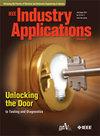用于便携式轻型电动汽车充电器开发的单级隔离AC/DC LLC谐振功率转换级,降低了电流/电压应力
IF 4.5
2区 工程技术
Q2 ENGINEERING, ELECTRICAL & ELECTRONIC
引用次数: 0
摘要
转换效率和系统功率密度是设计便携式、高性价比电动汽车充电器的关键参数。这是由于低、中功率处理通常采用双级功率转换,主要采用硬开关级。为了解决这一问题,本文设计了一种基于单级直接AC/DC LLC谐振变换器的电动汽车充电器。变换器采用栅极交错电感原理和栅极分离链路原理,使得每一交错相只实现栅极电压的一半。这种实现有效地降低了mosfet之间的电压应力,并促进了不连续交错电感电流模式(DIICM)操作的固有功率因数校正。DIICM设计包含紧凑的被动足迹,便于直接控制实施。采用时间加权平均设计(TWAD),鼓励基于系统约束的元素设计。此外,交错状态的DIICM和LLC油箱参数的TWAD设计实现了单个充电电流控制回路,在充电电流跟踪的同时提供直流链路升压能力。提出的概念通过0.5 kW的模拟设计和1.5 kW的实际实验室原型进行验证,以实现42-58 V输出电压范围内的高效电动汽车充电。通过电网和充电场景的仿真和实验结果验证了所提出的设计。本文章由计算机程序翻译,如有差异,请以英文原文为准。
Single Stage Isolated AC/DC LLC Resonant Power Conversion Stage With Reduced Current/Voltage Stress for Portable Light EV Charger Development
Transformation efficiency and system power density are critical parameters in design of a portable, cost-effective EV charger. This results from conventionally adopted dual-stage power conversion for low and medium power processing, featuring a primary hard-switched stage. This paper presents a design for a single-stage direct AC/DC LLC resonant converter-based electric vehicle charger to address this issue. Converter employs an interleaved inductor principle at grid end and split grid link principle so that each interleaved phase realising only half of grid voltage. This implementation effectively reduces voltage stress across MOSFETs and facilitate inherent power factor correction with discontinuous interleaved inductor current mode (DIICM) operation. DIICM design encompasses compact passive footprints and facilitates straightforward control implementation. A time-weighted average design (TWAD) is adopted, which encourages elements design based on system constraints. Furthermore, DIICM of the interleaved state and TWAD design of LLC tank parameters enable a single charging current control loop, which offers DC link boost capability alongside charging current tracking. Proposed concept is validated through a 0.5 kW design for simulation purposes and a 1.5 kW practical laboratory prototype to enable efficient EV charging for 42-58 V output voltage range. Proposed design is validated with simulation and experimental results over grid and charging scenarios.
求助全文
通过发布文献求助,成功后即可免费获取论文全文。
去求助
来源期刊

IEEE Transactions on Industry Applications
工程技术-工程:电子与电气
CiteScore
9.90
自引率
9.10%
发文量
747
审稿时长
3.3 months
期刊介绍:
The scope of the IEEE Transactions on Industry Applications includes all scope items of the IEEE Industry Applications Society, that is, the advancement of the theory and practice of electrical and electronic engineering in the development, design, manufacture, and application of electrical systems, apparatus, devices, and controls to the processes and equipment of industry and commerce; the promotion of safe, reliable, and economic installations; industry leadership in energy conservation and environmental, health, and safety issues; the creation of voluntary engineering standards and recommended practices; and the professional development of its membership.
 求助内容:
求助内容: 应助结果提醒方式:
应助结果提醒方式:


